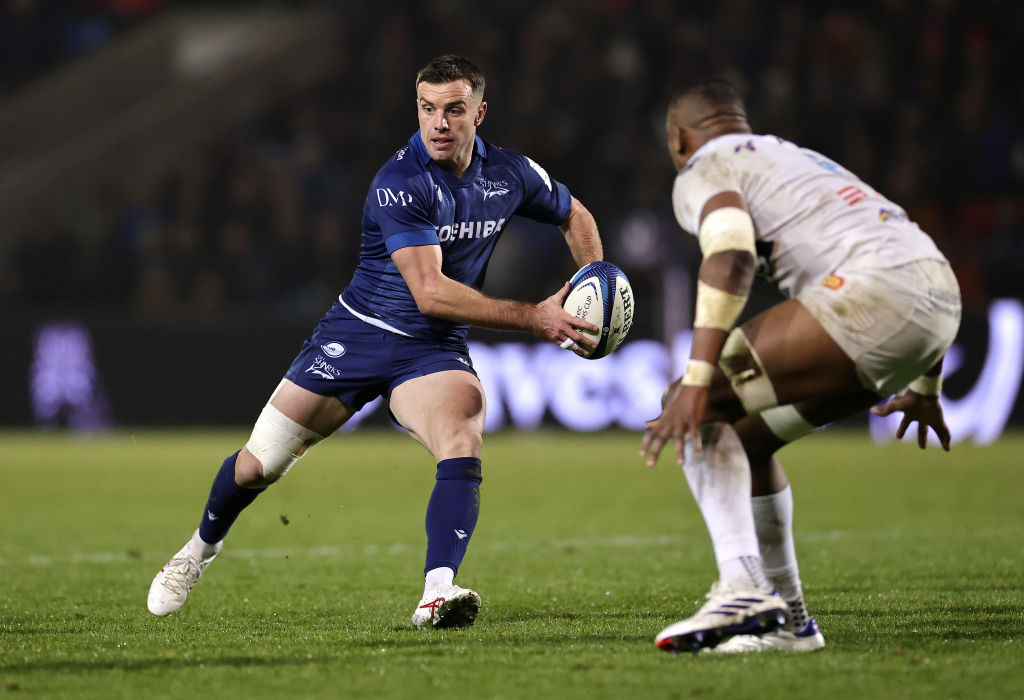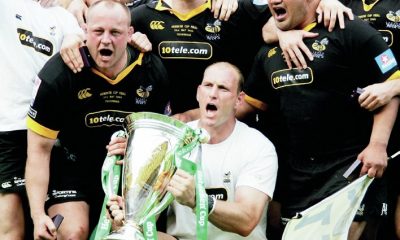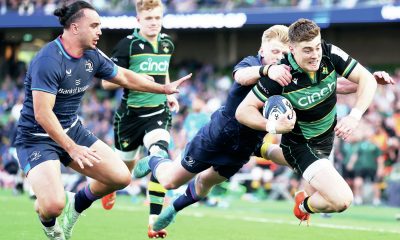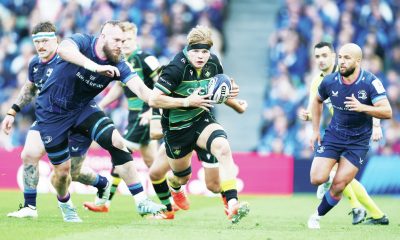 Exactly 30 years ago Pontypool embarked on a season, the likes of which we will never see again in Britain or Ireland. In just under eight months they played 50 competitive games, won 46 drew 2 and lost the remaining two games by a collective total of three points. In fact, bearing in mind that four Five Nations Saturdays lay fallow in those days and the season ended on the last Saturday in April, Pooler’s remarkable record was actually compiled in seven manic but exhilarating months of rugby. The concept of “burn-out” simply did not exist. The mean machine just kept grinding away.
Exactly 30 years ago Pontypool embarked on a season, the likes of which we will never see again in Britain or Ireland. In just under eight months they played 50 competitive games, won 46 drew 2 and lost the remaining two games by a collective total of three points. In fact, bearing in mind that four Five Nations Saturdays lay fallow in those days and the season ended on the last Saturday in April, Pooler’s remarkable record was actually compiled in seven manic but exhilarating months of rugby. The concept of “burn-out” simply did not exist. The mean machine just kept grinding away.
And before you get sniffy about the fixture list Pooler comfortably saw off all ten English clubs they played – Waterloo, Leicester, Nuneaton, Coventry, Bristol, Saracens, Bath, Bedford, Gloucester, London Irish and recorded the double against their six Gwent neighbours. Elsewhere only Cardiff, by one point, and Neath by two could lower their colours in the Welsh Merit Table and Anglo-Welsh league all-season.
The domestic matches in Wales were never less than ferocious and often bitter and bloody. Virtually every game, by dint of geography, was a derby of sorts. The national team may have been in slow decline but the Welsh club scene was vibrant with 17 first-class teams still going head-to-head and a fear and loathing of Pooler the only thing that united East and West.
Only in the occasional ‘thank-you’ friendlies against junior neighbours, where they recruited many of their players, did Pooler get any respite and even those could be physically demanding. The big names played to ensure a gate and the punch-ups are recalled to this day. Midweek rugby – remember that? – was a fact of life, in fact it often seemed like the staple of Welsh rugby.
Many of the biggest games were played under floodlights to capacity crowds on Tuesday or Wednesday nights. Christmas Eve and Boxing Day rugby was the norm – indeed Pooler played five games in the last 11 days of December 1983 and it remains an enduring mystery quite how busy amateurs managed such commitment.
Top points scorer Peter Lewis was a surgeon in Newport, prolific wing Goff Davies was a teacher at Hartridge School and captain Eddie Butler was also a teacher over the border at Cheltenham College. Others were miners, steel workers, commercial reps and even stall holders at Pontypool market. Certainly when I covered Pooler for the three years following the record breaking 1983-84 season, pre-match warm-ups for midweek home matches were often non-existent as all concerned raced to Pontypool Park.
Their motivation was never money, Pontypool never had any to talk of it and the murky ‘boot-money’ guys tended to steer clear. When Bobby Windsor was being ‘persuaded’ by Ray Prosser to join Pooler from Cross Keys, the Wales hooker – who was used to Cross Keys committee men putting a few notes in his blazer pocket every Saturday night – asked outright how much he would get.
“We pay **** all, we will give you a game and that’s all we are giving you,” replied an outraged Prosser. Windsor joined nonetheless, a decision he never regretted.
So Pooler’s strange genius – for that is what it was – came from within. Bloodyminded civic pride played a big part as did a freakish gathering of talent but there was also science and much rugby nous in how they conducted themselves.
“We played because we bloody well wanted to, it was our great pleasure and pride,” says former lock John Perkins. “There was no money. I got £1 expenses for my travel from Blaenavon and that was it apart from a belly full of beer and plate of sandwiches. If I took time off work, I had to make the hours up in the week but I could never get enough rugby. Around Christmas and Easter we played constantly and I would be seriously miffed if I was rested for any games. The other thing was we had so many tidy players that you were frightened of the other guy coming in and having a good match. Fantastic days, we had the very best of it.”
Legendary prop Graham Price concurs: “We were the fittest side in Britain, the constant midweek matches ensured that and we only had one training session together all week where ‘Pross’ worked us like dogs for an hour and half with the famous runs up to the grotto the ‘highlight’. I’ve seen grown men broken in half, left weeping, by our sessions. The onus was always to be in fantastic physical shape before you ever went anywhere near the ground. That meant training on your own or with a small group, working hard running all summer.
“I lost count of the games we won by simply destroying the opposition in the final quarter. Also, when you are fitter than the opposition it is easier to think clearly, implement game-plans when the going gets really tough.
“Team spirit was great. There were a lot of strong individual characters but we were very close as a team and nothing came between us. Some of our weekends away – to Waterloo, Sale or Shannon – were legendary. Team bonding you’d call it now and probably pay somebody tens of thousands of pounds to organise it. Massive piss-ups in any other language.
“Pross is an amazing individual and rugby man and deserves a lot of credit. It was Pross who put the great Pontypool teams together. When he took over Pooler had just finished below Penarth in the Merit Table – nobody finished below Penarth in the Merit Table. Within two seasons we were champions and the glory years began.”
Quite why Pontypool of all the Welsh clubs failed to step up to the plate in the professional era is perhaps another big question for another day but one thing is manifestly clear, illustrated perfectly by their heroics 30 years ago.
Long before the IRB’s epoch-breaking decision to declare the game open in 1995 they were totally ‘professional’ in their commitment to fitness and playing. Real professionalism is nothing to do with earning money for playing, that is simply the side-product. Irony of ironies, the open era stripped Pooler of their most potent weapon.
And as Prosser once told me: “You have to work for everything in life and I think we stopped working. Perhaps we got tired. We got used to success and assumed that would always be the way of things. Well, it bloody well ain’t, never has been. We paid a heavy price.”
The Mean Machine 30 years ago (all nicknames bestowed by Ray Prosser)
Peter Lewis: The Doc remains a general surgeon at St Joseph’s Hospital, Newport, and was a goal kicker of surgical precision.
Goff Davies: Sheets was an oasis of calm and sanity amidst the madness. Quiet schoolmaster, deadly try scoring. Retired headmaster of Hartridge School.
Lyndon Faulkner: Better known now as Lyndon J Faulkner one of the top CEOs in America. Worked for Nimbus in Wales, helped develop and market the CD before moving to Microsoft and introducing X-box and Windows vista. The Tony O’Reilly of the modern era. Charlie Faulkner’s nephew.
Lee Jones: Mercurial West Walian whose career ended when he broke a bone in his neck playing for Wales B.
Bleddyn Taylor: Another West Walian speedster, nephew of assistant coach Ivor Taylor. Ended his career at Dunvant.
Mike Goldsworthy: Goldie was from Penarth and arrived at Pooler via Glamorgan Wanderers. Big mate of the Bish.
David Bishop: The Bish bought Pross a colour TV when he ‘went North’. Now a radio personality back in Cardiff. Rugby’s best ever one-cap wonder.
Graham Price: Pimplehead is still fit as a fiddle despite much surgery and doing the Grotto run. Media pundit.
Bobby Windsor: Bobby was recently voted Wales’ all-time hardest player. Retired from playing aged 41 and now lives in Spain.
Steve Jones: Junna used to do 500 press-ups every night watching the TV. Best player never to represent Wales. Died prematurely in 2007.
Staff Jones: Fatarse was a tough scrummager and one of the many former miners who have represent Wales with honour. Coaches at Ynysbwyl.
Mike Crowley: Biffo was an ultra reliable deputy in the front row when the galacticos occasionally took the night off.
John Perkins: Perky was a genuine hard case and enforcer from Blaenavon who lived for the club. Still works for Doncaster’s in Blaenavon.
Kevin Moseley: Boris to one and all, giant lock who became the coach of Cornish Pirates after retiring.
Chris Huish: Madman qualified for Wales and England but scandalously ignored by both. Emigrated to Australia, now a refuse man on Bondi beach.
Eddie Butler: Bamber became a journalist for the Observer and Guardian and BBC rugby commentator. Voice-over maestro for their arty montages.
Jeff Squire: One of the greatest ever Wales back rowers. Last heard running the leisure centre side of a chain of hotels in South Africa.
Mark Brown: Shaft was a speed merchant at openside flanker. Wales Sevens star, still works as a quantity surveyor in Cwmbran.
Coach Ray Prosser: Still hale and hearty, seen regularly at home matches or enjoying a pot of tea at the cafe in Pontypool market.
Assistant Ivor Taylor: Quiet, efficient, sidekick to the force of nature that was Prosser. Now retired and living in Swansea.

2 Comments
You must be logged in to post a comment Login
Leave a Reply
Cancel reply
Leave a Reply
You must be logged in to post a comment.

Latest News
George Skivington playing it smart at Gloucester

English Championship
English second tier gets rebrand to ‘Champ Rugby’




























John Lewis
7 November 2013 at 1:12 PM
Goof Davies was my form teacher at Tredegar Comprehensive, Hartridge was a pipe dream then!
Pingback: ai nude